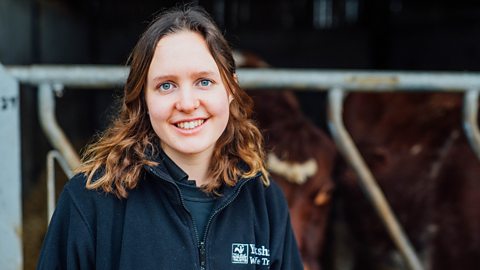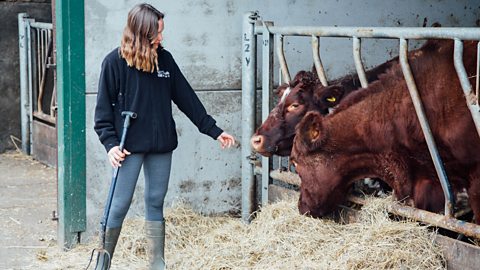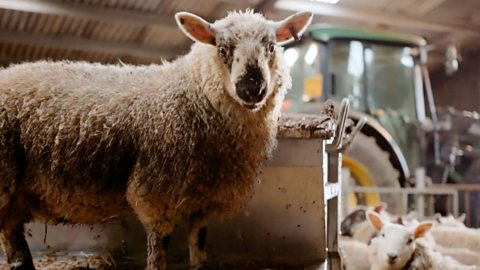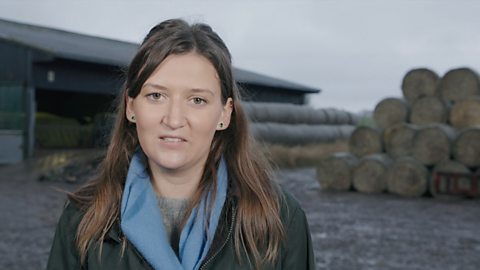Meet Lorna, 23, from Glasgow. She is a conservation apprentice in North Yorkshire for the Wildlife Trust. Part of our Bitesize world of work series.

I feel like I am doing things for future generations.
What is your job?
We maintain and improve habitats for wildlife. It's a very varied role! We do conservation work all over North Yorkshire, but we also engage and educate young people about our work. One day a week we’re based on a farm, working with cattle and sheep. The rest of the time we maintain reserves, making sure they’re accessible, and we get involved in campaigns to connect people with their local wildlife. We try to inspire other people – we are creating a wildlife pond in a local town to give local people skills in conservation.

What skills do you use in your work?
I’ve learned practical skills on the job, like fencing and managing orchards. Public speaking is important for campaigning. I use English in the campaign work when I’m writing blogs or social media posts. Teamwork and communication are really important, as well as time management.
What subjects did you study at school?
At school I did Maths and Sciences, including Physics. I thought I wanted to be an engineer. It wasn’t until I went to a conservation open day that I saw I could do it as a job, so I went on to do a Geography degree instead. Geography gave me my passion for landscapes, nature and wildlife.
How did you get into your job?
Whilst I was at university I saw a year’s internship and thought it’d be an amazing way to get all the life skills and training I wanted! I didn’t know what particular job I wanted within the sector so during this year I can try all the different parts and, by the end of the year, I’ll have a better idea of what I want to do.
Was it a smooth ride?
Definitely not. I wasn’t happy in my last year of school, and I felt a lot of pressure to go to a red brick university, so I went to St Andrews to study Geography. I ended up getting an eating disorder, and struggled with it for a year before I was diagnosed and had to drop out of university. I was too ill to do anything, I couldn’t think straight and I didn’t see a future for myself. I was in hospital for five months. I came out and took the rest of the year off to get better, and then reapplied to university. Going back to uni was a big step, but I got so much support there and I’m so much better than I was.
Being outside everyday is one of the best things I’ve done for my mental health. Feeling the sun, the wind and the rain on my face makes me appreciate life so much more – when you can see it all around you and you know you’re making a difference.
For support and advice on eating disorders, please visit the .


Top tips
Loads of people don’t know what they want to do. You can always change your mind and you can change jobs
Volunteering was the most important thing I did. I got hands-on experience, made contacts and got to live in some beautiful places in Scotland
°Хіу±р°щ±р’s no pressure to rush into this field – conservation is a job that you can get into at any time in your life
Chill out!

Lorna's conservation apprenticeship will provide her with relevant experience to apply for a job in conservation, such as a countryside officer. Countryside officers manage, protect and improve the rural environment.
What to expect if you want to be a countryside officer
- Countryside officer average salary: ВӘ19,000 to ВӘ34,000 per year
- Countryside officer typical working hours: 39 to 41 hours per week
What qualifications do you need to be a countryside officer?
You could get into this role via a university course, a college course (such as a Level 2 Diploma, a Level 3 Certificate or a T-level in Agriculture, Land Management and Production - England-only, from Sept 2023) or an intermediate apprenticeship for countryside workers or higher apprenticeship for countryside rangers. Check with your course provider which alternative qualifications they accept. Paid or unpaid work experience can be very useful when applying for jobs. Organisations like , the and offer training for volunteers.
Sources: LMI for All, National Careers Service,
This information is a guide and is constantly changing. Please check the for the latest information and all the qualifications needed and the for more on T-levels.
For careers advice in all parts of the UK visit: , , and .


Find work experience placements with Workfinder.
Tips and advice
Help with interviews, writing a CV and all things work experience related.


Careers in agriculture collection
Find out what you could expect from careers in agriculture

Jenny: farming union policy manager. video
Jenny works as a policy manager for the National Farmers' Union Scotland.

Jade: apprentice conservation officer. video
Jade's apprenticeship focuses on helping the environment to thrive as much as possible.
